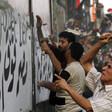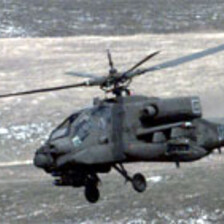The Electronic Intifada 9 October 2002
AS THE Arab region helplessly awaits what seems inevitable, as the diplomatic as well as military preparation for war continues, a major event of ominous consequences took place in Washington, and took us by surprise here. The surprise is not because all our attention in the region is intensely focused on what the debate at the Security Council will produce, or how to prepare for one of the most serious threats closing in on us. No, and it must be painfully admitted that in this region we do not seem to have much more attention left to spare on any of the approaching dangers from any possible direction. It is sheer and negative indifference.
We read a lot about plans being drawn out for the region, about a new Sykes-Picot-style distribution of war acquisitions, in the manner the European powers had planned, during the course of the World War I, for the vast domains left behind the then disintegrating “Sick Man of Europe”, the Ottoman Empire. We read about partitioning Iraq, about redrawing the borders, about changing regimes, about enabling Israel to realise its territorial and regional ambitions without any obstruction, about a virtual recolonisation of the entire region. We also read about controlling the oil and the other natural assets that must be a prime target of the war. We do indeed read, speculate, invent scenarios, discuss, anticipate havoc, cast doubt on intentions and even realise the existential implications of all this. We do also warn of the dire consequences and the destabilising effects. But we do all that as if we were outsiders, indifferent observers, academic enthusiasts, and as if it weren’t us, the people and the states that exist in this part of the world, sitting right where the blow will hit. Is there anything more amazing than the Arab League holding an emergency session to discuss a serious Arab crisis, such as the siege on Yasser Arafat or the reoccupation of the West Bank, and ending with an appeal to the international community to intervene while, when it condemns and regularly puts Israel before its responsibilities, it never tells us what the league itself should do?
This perhaps is what one should realistically expect from the Arab League in response to Washington’s decision to recognise Jerusalem, all Jerusalem, East Jerusalem included, as Israel’s capital. If the Jerusalem Committee determines that the significance of such an American measure is worthy of its time and endeavour, one should be in no doubt that a similar condemnation will be issued, accompanied by an appeal to the US to reconsider and a warning of the dangerous implications of such an “untimely” action for the “peace process”.
It is already four days since President George Bush signed into law a congressional bill that demanded the US government to consider Jerusalem as the capital of Israel, that the US embassy should be moved from Tel Aviv to Jerusalem and that the US consulate in East Jerusalem should be attached to it, and the Arab Muslim response is still barely heard. The foreign minister of an Arab state described the move as “an encouragement to Israel”. Another said “it threatened peace and security in the region and the world”, but he did not explain how, or what, his government would do to protect regional and world peace from such a threat.
In the past years, Congress attempted to pass similar legislation on Jerusalem but it was always blocked by the White House on security grounds. Most likely, some consideration was given to Arab feelings towards the matter. This time, the president signed it, but neither the accompanying claim that the US policy on Jerusalem has not changed nor the notion that, as in the previous years, implementation would be hindered detract from the seriousness of this move.
The dangers implied in this major American policy change on the status of Jerusalem cannot be further emphasised. It is an American endorsement of all the previous Israeli illegal actions with respect to the city, including the occupation, the annexation, the Judaisation, the changing of the demographic and physical character of the city and the building in it of 10 large settlements housing over 200,000 settlers.
By doing this the US is actually acting in complete disregard of all the UN resolutions on Jerusalem, on which it had voted in favour, and of all the provisions of international law. It is thwarting all the basis on which any possible settlement of the conflict can be based, including Oslo, Madrid, the recent Danish peace plan, as well as the “vision” of the president himself contemplating a Palestinian state with East Jerusalem as its capital. It is further revealing insensitivity, even contempt for the feelings of hundreds of millions of Arabs, Muslims and Christians, at a time when all efforts should be mobilised to heal the rifts and to build bridges of understanding and solidarity towards more peace and justice. And it is a corrupting move for Israel whose wild ambitions for colonial expansion at the expense of everything right and legal should be firmly checked, as a first step towards ending its brutal occupation and paving the way for any possible reconciliation.
But for us in the Arab world the move means much more than all that. It means that we have become so insignificant as a nation that no longer does anyone take into consideration any response from us to whatever injury, insult or harm they may cause us. We have made of ourselves easy targets and it is not a mere coincidence that the three United Nations member states currently, and for many years already, under international sanctions are Arab states. It is not a mere coincidence that when a superpower wants to show muscle, it dispatches cruise missiles or sends its air force to bomb Arab capitals, often for no reason whatsoever, as when the US bombed and totally destroyed the Khartoum Pharmaceuticals compound in 1998 on the baseless claim that it was producing nerve gas for terrorists and Iraq.
It is also not a usual situation, and it is extremely difficult to find a parallel for it in history, that the US is preparing openly and against the expressed will of the Arab states and their league to attack and topple the regime in an Arab country while its interests in the region and its relations with the states of the region are perfectly secure, exceptionally cordial and normal. It is astonishing how the US can fully support Israel, provide it with all the money, the arms and the political protection it needs in its war against the Palestinians, and for maintaining its occupation of Syrian and Lebanese lands while, at the same time, the Palestinian leadership, as well as all those who continue to follow the mirage of the “peace process” pin all their hopes on American “justice” and fairness for settling the historic conflict and securing Arab lost rights.
The fact that an Arab country is targeted for destruction now, and that Jerusalem is granted to Israel as its capital, in addition to other ongoing abuses, is directly and closely linked to the sad reality of incompetence, loss of willpower, paralysis and defeatism that prevails in the Arab world. The Arabs are undeniably weak, but it is not the lack of military capability that is the problem. It is not only by military force that people defend their rights and protect their national integrity. There are countries in the world that do not have one single soldier and they are well respected and their rights and interests are well protected. That is precisely what we need in this part of the world. We need to shed layers of backwardness and mediocrity. We need to face the mirror and identify major defects in our national conduct and performance. We have no excuse, as a nation, for being fragmented, weak, impoverished (with all the wealth we have) and lagging behind in the fields of education, culture, governance, health, economic progress and social advancement. We cannot continue to claim a secure place amongst the civilised nations with our unique brand of democracy that guarantees some of Arab countries’ leaders lifetime mandates with no less than a 99.999 per cent of constant popular support.
To be a victim of injustice does not guarantee one’s automatic righteousness. The planned war against Iraq is certainly unlawful, unjust and wrong. The 12-year-long sanctions have been equally harsh and unjustified. Yet, the Iraqi situation and the position of the Iraqi regime is not perfect either. The present mess cannot be separated from what happened earlier. In the eighties, a decade of depleting war with Iran caused enormous damage to both countries, as well as heavy drain of Arab financial resources. The vast amount of wasted capital could have contributed enormously to much needed economic development all over the Arab region. That was immediately followed by a much more serious and costly Iraqi blunder with the invasion of Kuwait. The additional divisions this caused among the Arabs exposed them to all kinds of vulnerabilities, forcing them to mortgage their destiny to the same foreign powers which plan for more wars now and threaten our very stability, if there is any left. The Arab responsibility for keeping this malignant conflict alive and growing should not be disguised either. What has the Arab League, with all its glorious summits, been busy at during the last 12 years? And if the answer is absolutely nothing, what is the point in maintaining such a useless club which has only been accumulating failures?
Before we place the blame for what is happening in Palestine and in Iraq on everyone else but ourselves, we should be able to define our responsibilities and admit our spectacular failures. Yes, Israel is an aggressor with indefinite plans for expansion and colonisation, and it is securing the ultimate support of the US. The Jerusalem for Israel decree is unquestionably a direct product of that. But it is also a product of a more bitter fact, which is the total American disregard of, even scorn for, the Arab feelings and existence.
Does that justify our inability to defend our lands and our dignity? Being victims of a superpower-supported aggression does by no means cover for our decline or mean that the only course of action available to us is to sit helplessly receiving one blow after the other and, as the Arab League does, appeal for help from the international community. Neither it is building fighting armies and preparing for a counter-war that is required. All that is needed, and urgently, is to put together our shattered existence, conduct ourselves and our national affairs in a manner which will restore our dignity and command for us some respectability.
No change will ever happen, except for the worse, before we change ourselves and radically review our performance. Until that happens, we will continue to sit like lame ducks and count disasters.
The writer is former ambassador and permanent representative of Jordan to the UN.





